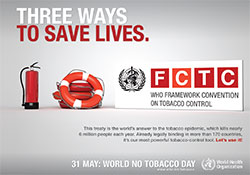2011: WHO Framework Convention on Tobacco Control

WHO
World No Tobacco Day, 31 May 2011 focuses on the WHO Framework Convention on Tobacco Control
Globally, more than 6 million premature deaths occur each year due to tobacco. In the WHO European Region, tobacco is the cause of 1.6 million deaths. Unless we act, there will be more than a billion deaths from tobacco, worldwide, in the 21st century. All of these deaths could have been prevented.
What can we do?
Adoption and full implementation of the WHO Framework Convention on Tobacco Control (WHO FCTC)
The WHO FCTC is an evidence-based treaty which provides a legal framework for cooperation in tobacco control. It is a powerful tool for governments, civil society and the general public. As with any other treaty, the WHO FCTC confers legal obligations on its Parties – that is, on the countries (and the European Union) that have formally acceded to it.
In the WHO European Region, 47 (out of 53) countries and the European Community are Parties. It is the first treaty ever negotiated under the auspices of WHO. It has only been in force since 2005, but already, it is one of the most rapidly and widely embraced treaties of the United Nations, with more than 170 Parties globally.
Key message of World No Tobacco Day (WNTD) 2011
WNTD 2011 focuses on the following key message: Countries must ratify and fully implement the treaty to protect present and future generations from the devastating health, social, environmental and economic consequences of tobacco consumption and exposure to tobacco smoke.
As the world's foremost tobacco control instrument the treaty calls on the full support of Parties for implementation and encourages non-parties to take steps to ratify the WHO FCTC. Individuals and civil society should encourage and help their governments to fulfil that obligation, including supporting enforcement of smoke-free legislation, reducing second-hand exposure among non-smokers, telling people about the dangers of tobacco, not selling tobacco to minors, quitting tobacco and/or helping people to quit, and much more.



